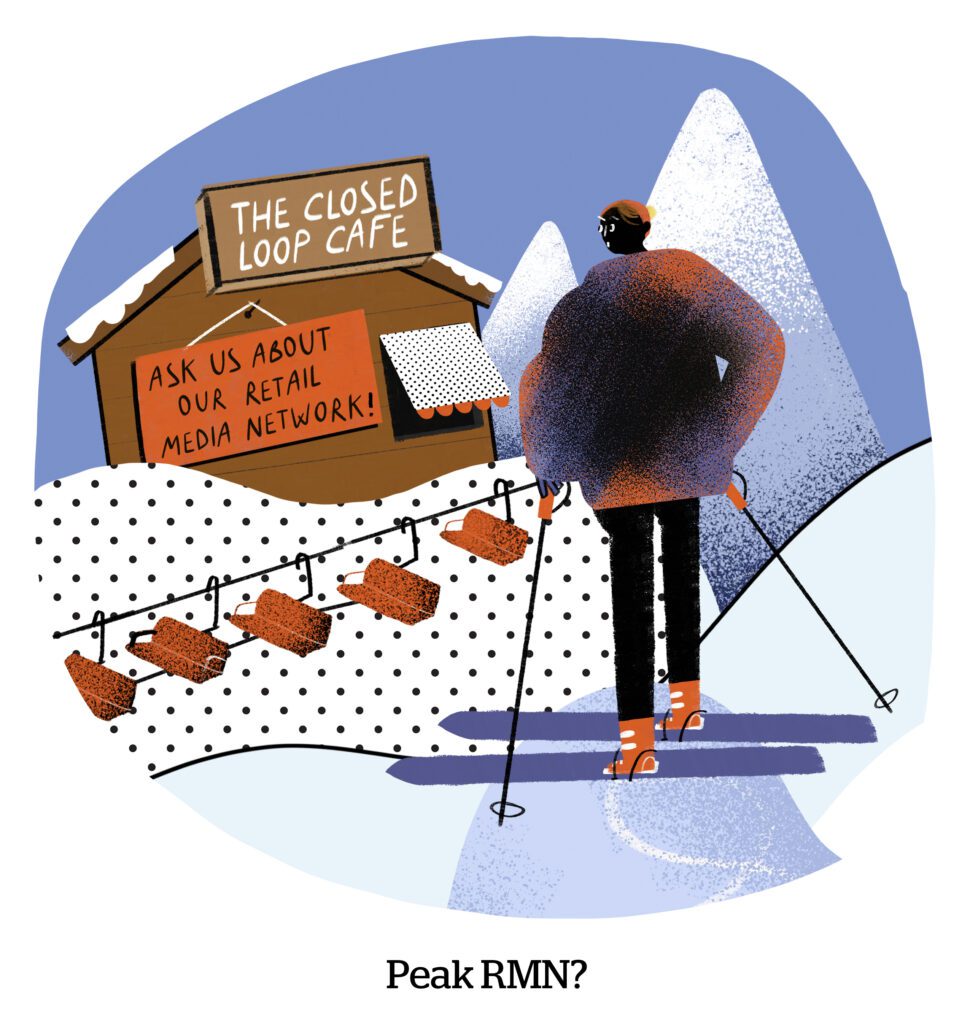Two years ago, retail media networks were at a crossroads. At the time they were weighing whether to become traditional walled gardens or allowing the programmatic ecosystem open access to data.
Retailers are long past that point. Hundreds of store operators launched retail media businesses in the past couple years alone. And most of the category is opening up shopper audience data to programmatic tech, so that shoppers might be targeted, attributed and analyzed similar to as with open web advertising.
Even Walmart has opened up since it launched with The Trade Desk as its DSP – although a retrofitted DSP that acts as walled garden, so the ad ID field is redacted. Walmart Connect, the ad business, has since added the typical early ad API partners, Pacvue, Skai and Flywheel Digital (now owned by Omnicom), and measurement and targeting partners including TikTok, Roku and Snapchat.
Walmart still withholds the ad ID, so it is a walled garden. But even other large retailers like Kroger, Target, Albertson’s and Macy’s do pass programmatic IDs.
There is now a new question for retail media: Will retailers come to regret it?
The legal gray zone
A Fortune 500 CPG marketer told me that four or five years ago the company’s privacy team was closely vetting retail media partners. As a brand carried in every store imaginable, there were many new platforms coming online. At the time, the marketer said, the privacy lawyers were dinging retailers left and right.
Most were approved. But almost as many were rejected because they didn’t have the auditability or privacy and security standards the company maintained for itself and typical marketing partners, according to the marketer.
Many retail media networks (RMNs) don’t have impression-level transparency. In other words, marketers don’t know where the ad ran or how the targeting worked, and it was all under the retailer’s control, so they couldn’t tell if their own data might be used inappropriately without consent.
But the same privacy lawyers in general are now clearing RMNs, said the same marketer, since many retailers have added verification partners like DoubleVerify or Integral Ad Science and brands have had time to acclimate.
I like the anecdote, because retail media walks a fine line between acceptable revenue grab and potential repercussions – be they from consumer or regulators.
For instance, Uber and Lyft have similar businesses and launched RMNs around the same time. But Uber is much more open. It added self-serve programmatic in June, for one thing. But its destination targeting product gives immense leeway for advertisers to geofence areas or specific locations and create segments (anyone taking an Uber ride to the Hamptons, for instance, or to a certain store, might be targeted and retargeted). Lyft, by comparison, is more cautious. It’ll package segments like “airport travelers” in a managed service, but advertisers can’t hone audience segments in personal or revealing ways.
Some digital publishing vets, who have seen this film before, have words of caution to retailers jumping headlong into programmatic.
Take Aram Zucker-Scharff’s response to an Experian exec’s presentation on shopper data monetization at the IAB’s Connected Commerce Summit in New York City this week. “I honestly believe that one day we’ll look at this tweet as a document in a criminal proceeding,” Zucker-Scharff, the Washington Post’s lead privacy engineer, tweeted.
Sure, X is a place for hot takes. But Zucker-Scharff’s hypothetical isn’t so hypothetical at all. In Europe, GDPR prohibits many of the data sharing and targeting practices that are typical to American RMNs, at least not without pristine consent policies and opt-in rates.
The massive backstop of credit score and consumer data brokerages like Experian, Acxiom, Epsilon and TransUnion is essentially an American phenomenon.
Next up, conquest marketing
Now that retailers have gotten comfortable with the programmatic business – i.e. with their shopper data becoming audience and attribution data – the next frontier is likely to be a cascading adoption of conquest marketing.
For the biggie walled gardens, Google, Meta and Amazon, conquesting is the name of the game. If someone searches for “Colgate toothpaste” on Amazon, and Colgate doesn’t defend its own search term, the top result will probably be a sponsored unit by a third-party seller or a cheaper non-Colgate brand.
Conquesting is like auction steroids. It creates situations where advertisers will pay heavily to divert a rival’s potential regular customer. And brands themselves will set high floors on their own search terms to force competitors to overpay in an attempt to peel off a customer.
But retailers have been cautious of conquesting. Walmart began allowing advertisers to bid on other brands’ search terms this year, one Walmart Connect advertiser told me at the IAB conference.
Other retailers will likely follow suit.
The case against conquesting is that a shopper on a Kroger-owned grocery site who searches “Kraft-Heinz hot dogs,” actually wants that brand.
But as retailers increase the number of brands and advertisers on their platforms, the squeamishness about conquesting will go by the wayside, although it will tick off some brands and shoppers.
Retailers have already shown they’ll grab for the low-hanging fruit by opening their platforms and data to third-party programmatic, said the same marketer who mentioned Walmart Connect’s new conquesting policy.
“Are they going to say no to the easy money of conquesting?” he said. “I doubt it.”














